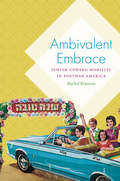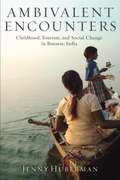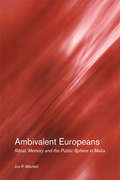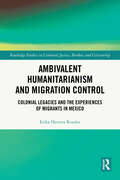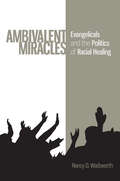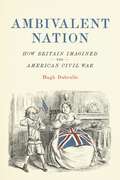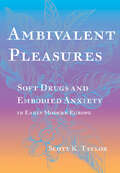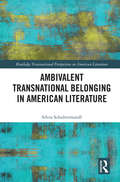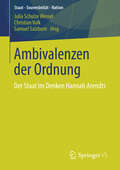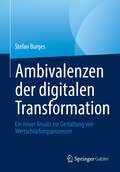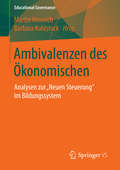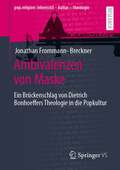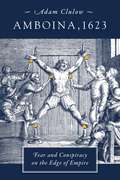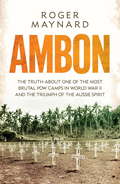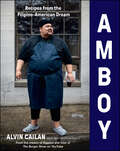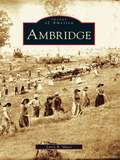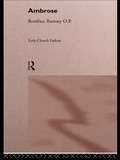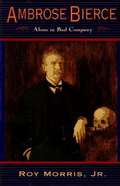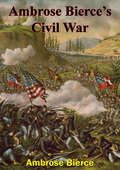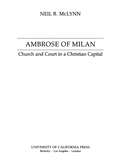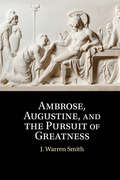- Table View
- List View
Ambivalent Childhoods: Speculative Futures and the Psychic Life of the Child
by Jacob BreslowExplores childhood in relation to blackness, transfeminism, queerness, and deportability to interrogate what &“the child&” makes possibleThe concept of childhood contains many contested and ambivalent meanings that have extraordinary implications, particularly for those staking their claim for belonging and justice on the wish for inclusion within it. In Ambivalent Childhoods, Jacob Breslow examines contemporary U.S. social justice movements (including Black Lives Matter, transfeminism, queer youth activism, and antideportation movements) to discover and reveal how childhood operates within and against them.Ambivalent Childhoods brings together critical race, trans, feminist, queer, critical migration, and psychoanalytic theories to explore the role of childhood in shaping and challenging the disposability of young black life, the steadfastness of the gender binary, the queer life of children&’s desires, and the precarious status of migrants. Through an engagement with&“the psychic life of the child&” that combines theoretical discussions of childhood, blackness, transfeminism, and deportability with critical readings of films, narrative, images, and social justice movements, Breslow demonstrates how childhood requires sustained attention as a complex and ambivalent site for contesting the workings of power, not only for the young. Ambivalent Childhoods is a forward-thinking and intersectional analysis of how childhood affects activism, national belonging, and the violence directed against queer, trans, and racialized people.
Ambivalent Conquests: Maya and Spaniard in Yucatan, 1517-1570
by Inga ClendinnenThis is both a specific study of conversion in a corner of the Spanish Empire, and a work with implications for the understanding of European domination and native resistance throughout the colonial world. Dr Clendinnen explores the intensifying conflict between competing and increasingly divergent Spanish visions of Yucatan and its destructive outcomes. She seeks to penetrate the ways of thinking and feeling of the Mayan Indians in a detailed reconstruction of their assessment of the intruders.
Ambivalent Embrace: Jewish Upward Mobility in Postwar America
by Rachel KransonThis new cultural history of Jewish life and identity in the United States after World War II focuses on the process of upward mobility. Rachel Kranson challenges the common notion that most American Jews unambivalently celebrated their generally strong growth in economic status and social acceptance during the booming postwar era. In fact, a significant number of Jewish religious, artistic, and intellectual leaders worried about the ascent of large numbers of Jews into the American middle class. Kranson reveals that many Jews were deeply concerned that their lives—affected by rapidly changing political pressures, gender roles, and religious practices—were becoming dangerously disconnected from authentic Jewish values. She uncovers how Jewish leaders delivered jeremiads that warned affluent Jews of hypocrisy and associated "good" Jews with poverty, even at times romanticizing life in America's immigrant slums and Europe's impoverished shtetls. Jewish leaders, while not trying to hinder economic development, thus cemented an ongoing identification with the Jewish heritage of poverty and marginality as a crucial element in an American Jewish ethos.
Ambivalent Encounters
by Jenny HubermanJenny Huberman provides an ethnographic study of encounters between western tourists and the children who work as unlicensed peddlers and guides along the riverfront city of Banaras, India. She examines how and why these children elicit such powerful reactions from western tourists and locals in their community as well as how the children themselves experience their work and render it meaningful. Ambivalent Encounters brings together scholarship on the anthropology of childhood, tourism, consumption, and exchange to ask why children emerge as objects of the international tourist gaze; what role they play in representing socio-economic change; how children are valued and devalued; why they elicit anxieties, fantasies, and debates; and what these tourist encounters teach us more generally about the nature of human interaction. It examines the role of gender in mediating experiences of social change--girls are praised by locals for participating constructively in the informal tourist economy while boys are accused of deviant behavior. Huberman is interested equally in the children's and adults' perspectives; her own experiences as a western visitor and researcher provide an intriguing entry into her interpretations.
Ambivalent Europeans: Ritual, Memory and the Public Sphere in Malta
by Jon P. MitchellAmbivalent Europeans examines the implications of living on the fringes of Europe. In Malta, public debate is dominated by the question of Europe, both at a policy level - whether or not to join the EU - and at the level of national identity - whether or not the Maltese are 'European'. Jon Mitchell identifies a profound ambivalence towards Europe, and also more broadly to the key processes of 'modernisation'. He traces this tendency through a number of key areas of social life - gender, the family, community, politics, religion and ritual.
Ambivalent Humanitarianism and Migration Control: Colonial legacies and the Experiences of Migrants in Mexico (Routledge Studies in Criminal Justice, Borders and Citizenship)
by Erika Herrera RosalesAmbivalent Humanitarianism and Migration Control explores the complex relationship between migrants and local aid organisations. These organisations have become indisputably relevant and highly regarded as allies to Northern Central American migrants trying to reach the United States. Thus, this book examines the implications of humanitarian actors in migration governance and bordering practices, which have serious and long-lasting effects on the lives of migrants.Through an in-depth research in Mexico, this book suggests that humanitarian organisations are ambivalent institutions because they intend to help and support individuals while reinforcing social and power inequalities. It explores the narratives, roles, and practices of humanitarian workers, and, at the same time, addresses migrants’ resistance. From an interdisciplinary approach that employs critical humanitarian perspectives, post/decolonial theories, and criminological studies, this study provides a comprehensive analysis of migration governance and migrants’ agency.A highly informative, insightful, and engaging read, Ambivalent Humanitarianism and Migration Control will appeal to students, scholars, and researchers in migration studies, border studies, sociology, and critical criminology. Given its international scope, it also will be of interest to academics, practitioners, and people in Latin America, the United States, the UK, Europe, and beyond.
Ambivalent Miracles: Evangelicals and the Politics of Racial Healing (Race, Ethnicity, and Politics)
by Nancy D. WadsworthOver the past three decades, American evangelical Christians have undergone unexpected, progressive shifts in the area of race relations, culminating in a national movement that advocates racial integration and equality in evangelical communities. The movement, which seeks to build cross-racial relationships among evangelicals, has meant challenging well-established paradigms of church growth that built many megachurch empires. While evangelical racial change (ERC) efforts have never been easy and their reception has been mixed, they have produced meaningful transformation in religious communities. Although the movement as a whole encompasses a broad range of political views, many participants are interested in addressing race-related political issues that impact their members, such as immigration, law enforcement, and public education policy. Ambivalent Miracles traces the rise and ongoing evolution of evangelical racial change efforts within the historical, political, and cultural contexts that have shaped them. Nancy D. Wadsworth argues that the stunning breakthroughs this movement has achieved, its curious political ambivalence, and its internal tensions are products of a complex cultural politics constructed at the intersection of U.S. racial and religious history and the meaning-making practices of conservative evangelicalism. Employing methods from the emerging field of political ethnography, Wadsworth draws from a decade’s worth of interviews and participant observation in ERC settings, textual analysis, and survey research, as well as a three-year case study, to provide the first exhaustive treatment of ERC efforts in political science. A 2014 CHOICE Outstanding Academic Title
Ambivalent Nation: How Britain Imagined the American Civil War (Conflicting Worlds: New Dimensions of the American Civil War)
by Hugh DubrulleIn Ambivalent Nation, Hugh Dubrulle explores how Britons envisioned the American Civil War and how these conceptions influenced their discussions about race, politics, society, military affairs, and nationalism. Contributing new research that expands upon previous scholarship focused on establishing British public opinion toward the war, Dubrulle offers a methodical dissection of the ideological forces that shaped that opinion, many of which arose from the complex Anglo-American postcolonial relationship.Britain’s lingering feeling of ownership over its former colony contributed heavily to its discussions of the American Civil War. Because Britain continued to have a substantial material interest in the United States, its writers maintained a position of superiority and authority in respect to American affairs. British commentators tended to see the United States as divided by two distinct civilizations, even before the onset of war: a Yankee bourgeois democracy and a southern oligarchy supported by slavery. They invariably articulated mixed feelings toward both sections, and shortly before the Civil War, the expression of these feelings was magnified by the sudden emergence of inexpensive newspapers, periodicals, and books. The conflicted nature of British attitudes toward the United States during the antebellum years anticipates the ambivalence with which the British reacted to the American crisis in 1861. Britons used prewar stereotypes of northerners and southerners to help explain the course and significance of the conflict. Seen in this fashion, the war seemed particularly relevant to a number of questions that occupied British conversations during this period: the characteristics and capacities of people of African descent, the proper role of democracy in society and politics, the future of armed conflict, and the composition of a durable nation. These questions helped shape Britain’s stance toward the war and, in turn, the war informed British attitudes on these subjects.Dubrulle draws from numerous primary sources to explore the rhetoric and beliefs of British public figures during these years, including government papers, manuscripts from press archives, private correspondence, and samplings from a variety of dailies, weeklies, monthlies, and quarterlies. The first book to examine closely the forces that shaped British public opinion about the Civil War, Ambivalent Nation contextualizes and expands our understanding of British attitudes during this tumultuous period.
Ambivalent Pleasures: Soft Drugs and Embodied Anxiety in Early Modern Europe
by Scott K. TaylorAmbivalent Pleasures explores how Europeans wrestled with the novel experience of consuming substances that could alter moods and become addictive. During the early modern period, psychotropic drugs like sugar, chocolate, tobacco, tea, coffee, distilled spirits like gin and rum, and opium either arrived in western Europe for the first time or were newly available as everyday commodities. Drawing from primary sources in English, Dutch, French, Italian, and Spanish, Scott K. Taylor shows that these substances embodied Europeans' anxieties about race and empire, religious strife, shifting notions of class and gender roles, and the moral implications of urbanization and global trade.Through the writings of physicians, theologians, political pamphleteers, satirists, and others, Ambivalent Pleasures tracks the emerging understanding of addiction; fears about the racial, class, and gendered implications of using these soft drugs (including that consuming them would make users more foreign); and the new forms of sociability that coalesced around their use. Even as Europeans' moral concerns about the consumption of these drugs fluctuated, the physical and sensory experiences of using them remained a critical concern, anticipating present-day rhetoric and policy about addiction to drugs and alcohol.
Ambivalent Transnational Belonging in American Literature (Routledge Transnational Perspectives on American Literature)
by Silvia SchultermandlAmbivalent Transnational Belonging in American Literature discusses the extent to which transnational concepts of identity and community are cast within nationalist frameworks. It analyzes how the different narrative perspectives in texts by Olaudah Equiano, Catharina Maria Sedgwick, Henry James, Jamaica Kincaid, and Mohsin Hamid shape protagonists’ complex transnational subjectivities, which exist between or outside national frameworks but are nevertheless interpellated through the nation-state and through particular myths about liberal, sentimental, or cosmopolitan subjects. The notion of ambivalent transnational belonging yields insights into the affective appeal of the transnational as a category of analysis, as an aesthetic experience, and as an idea of belonging. This means bringing the transnational into conversation with the aesthetic and the affective so we may fully address the new conceptual challenges faced by literary studies due to the transnational turn in American studies.
Ambivalenzen der Optimierung (Würzburger Beiträge zur Designforschung)
by Gerhard Schweppenhäuser Christian Bauer Judith-Frederike PoppInnovation, Wachstum und Optimierung sind normative Grundlagen des Designs, der Technologie, der Wirtschaft, der Gesellschaft und der Kultur. Unter dem Vorzeichen der Digitalisierung zeichnen sich neue ›Optima‹ ab, in denen Menschen zum Bestandteil entgrenzter Netzwerkstrukturen werden. Die in Würzburg entstandenen Aufsätze des vorliegenden Bandes gehen ambivalenten Aspekten dieser Entwicklung mit wissenschaftlichen und gestalterischen Methoden nach. Der Gastbeitrag geht der Frage nach, was dialektisches Denken in Diskurs und Praxis der Gestaltung bedeutet.
Ambivalenzen der Ordnung: Der Staat im Denken Hannah Arendts (Staat – Souveränität – Nation)
by Samuel Salzborn Julia Schulze Wessel Christian VolkEs besteht kein Zweifel, dass Hannah Arendt den klassischen republikanischen Tugenden des bürgerschaftlichen Engagements, der Partizipation und des politischen Handelns in ihrem Werk eine gewichtige Bedeutung verliehen hat. Ihr politisches Denken lebt von öffnenden Begriffen wie der Natalität, dem Anfang, der Pluralität, der Spontaneität oder der Freiheit des Menschen, etwas beginnen zu können. Und dennoch ist dieses Denken nur ein Teil von ihr und steht in einer konzeptionellen Beziehung zu einem dezidierten Ordnungsdenken, das in der Forschung bislang vernachlässigt wurde. Dieses stärker in den Mittelpunkt der Auseinandersetzung zu rücken, ist das Anliegen dieses Bandes.
Ambivalenzen der digitalen Transformation: Ein neuer Ansatz zur Gestaltung von Wertschöpfungsprozessen
by Stefan BurgesDurch technische Neuerungen wie Internet-of-Things, Machine Learning und Künstliche Intelligenz verändert sich das Marktumfeld für Unternehmen schnell und ständig. Darauf gilt es in der Unternehmensführung ebenso schnell zu reagieren bzw. diese Neuerungen besser noch zu antizipieren. In seinem Buch richtet Stefan Burges seinen Blick nicht nur auf die technischen Möglichkeiten, sondern auch auf den Menschen. Er unterscheidet zwischen Arbeiten und Prozessen, die durch Digitalisierung an Schnelligkeit und Zuverlässigkeit gewinnen, und Abläufen, die auf der Kommunikation zwischen Menschen beruhen. Folgerichtig analysiert Burges im ersten Teil des Buches den Wertschöpfungsprozess, die Protagonisten – digitale Systeme und Mitarbeiter – sowie deren Kommunikation. Im zweiten Teil werden strategische Handlungsfelder identifiziert und Alternativen für einen nachhaltigen Wertschöpfungsprozess vorgestellt.
Ambivalenzen des Ökonomischen: Analysen zur „Neuen Steuerung“ im Bildungssystem (Educational Governance #29)
by Martin Heinrich Barbara KohlstockBildung und Ökonomie sind wechselseitig aufeinander verwiesen: Es wird keine Autonomie der Bildung ohne ressourcielle Absicherung geben, ebensowenig wie eine moderne industrialisierte Gesellschaft mit Blick auf ihre Reproduktionslogiken auf die Produktivkraft ,,Bildung" verzichten kann. Am Beispiel bildungstheoretisch fundierter und empirischer Studien zu den differenten pädagogischen und ökonomischen Logiken innerhalb der ,,Neuen Steuerung" des Bildungssystems wird im vorliegenden Band aufgezeigt, dass es sinnvoll erscheint, sich weder vereinseitigend dem Pol des ökonomischen oder dem des pädagogischen Ideals zuzuschlagen, noch die im Verhältnis von Ökonomie und Bildung angelegten Ambivalenzen zu leugnen. Demgegenüber wird versucht, sich in einem analytischen Zugriff aus der Perspektive der Governance-Forschung eben jenen Ambivalenzen systematisch zu widmen.
Ambivalenzen von Maske: Ein Brückenschlag von Dietrich Bonhoeffers Theologie in die Popkultur (pop.religion: lebensstil – kultur – theologie)
by Jonathan Frommann-BrecknerEine Maske kann theologisch als ein Phänomen der Ambivalenz verstanden werden. Einerseits kann sie etwas zeigen, indem sie etwas anderes verdeckt. Andererseits kann sie etwas zeigen, was sonst verdeckt bleiben würde. Diese Unterscheidung lässt sich auf maskenähnliche Aspekte des Verhaltens von Menschen übertragen. Menschliches Verhalten kann zum Beispiel zwischen Zeigen und Verdecken, Aufrichtigkeit und Verstellung, Selbstausdruck und Selbstschutz oder Enthüllung und Verhüllung oszillieren. Vor diesem Hintergrund lässt sich eine Idee davon entwickeln, was es bedeuten kann, hinter eine Maske zu sehen oder etwas in einer Maske zu sehen. Dieser phänomenologische Fokus dient als Lektürebrille für Dietrich Bonhoeffers Werk – schwerpunktmäßig für Texte aus den Lebensphasen seiner Konspiration und Haft, in denen eine Theologie der Maske ausgemacht werden kann. Diese Theologie eignet sich als Aufhänger, Vergleichspunkt und Interpretament für die Auseinandersetzung mit Popkultur. Ein solcher theologischer Brückenschlag wird in Bezug auf Quentin Tarantinos Film Inglourious Basterds sowie Selfies im Rahmen von Social Media erprobt.
Ambizioni Illuminate al Neon
by Scott Hidenea Riccardo41 poesie ed illustrazioni derivate da esperienze di vita ricorrenti, innate in questo mondo moderno. Una combinazione sia di ispirazioni dirette che indirette mescolate con motivi fluorescenti illuminati
Amboina, 1623: Fear and Conspiracy on the Edge of Empire
by Adam ClulowIn 1623, a Japanese mercenary called Shichizō was arrested for asking suspicious questions about the defenses of a Dutch East India Company fort on Amboina, a remote set of islands in what is now eastern Indonesia. When he failed to provide an adequate explanation, he was tortured until he confessed that he had joined a plot orchestrated by a group of English merchants based nearby to seize control of the fortification and ultimately to rip the spice-rich islands from the Company’s grasp. Two weeks later, Dutch authorities executed twenty-one alleged conspirators, sparking immediate outrage and a controversy that would endure for centuries to come.In this landmark study, Adam Clulow presents a new perspective on the Amboina case that aims to move beyond the standard debate over the guilt or innocence of the supposed plotters. Instead, Amboina, 1623 argues that the case was driven forward by a potent combination of genuine crisis and overpowering fear that propelled the rapid escalation from suspicion to torture, that gave shape and form to an imagined plot, and that pushed events forward to their final bloody conclusion. Based on an exhaustive analysis of original trial documents, letters, and depositions, this book offers a masterful reinterpretation of a trial that has divided opinion for centuries while presenting new insight into global history and the nature of European expansion across the early modern world.
Ambon: The truth about one of the most brutal POW camps in World War II and the triumph of the Aussie spirit
by Roger MaynardSurvival, heroism, courage and mateship in Ambon - a place of nightmares.In February, 1942, Ambon, an Indonesian island north of Darwin, fell to the Japanese army and the Allied forces defending it were captured. Over a thousand of these soldiers were Australian. By the end of the war, just one-third of them had survived and Ambon became a place of nightmares, one of the most notorious of all POW camps the war had seen.Many of the men captured were massacred, and of those who initially survived, many later succumbed to the sadistic brutality of the Japanese guards. Starvation also took a fearful toll, and then there were the medical 'experiments'. It was a place almost without hope for those who held on, made worse by the fact that the savagery inflicted on them wasn't limited to their captors but also came from their own. One soldier described their hopelessness towards the end with the bleak words: 'The men knew they were dying.'Yet astoundingly there were survivors and in Ambon they speak of not just the horrors, but the bravery, endurance and mateship that got them through an ordeal almost impossible to imagine.The story of Ambon is one of both the depravity and the triumph of the human spirit; it is also one that's not been widely told. Until now.
Amboy: Recipes from the Filipino-American Dream
by Alvin Cailan Alexandra CuerdoFilipino recipes from the the creator of the legendary Eggslut in LA, host of the hit online series The Burger Show, and the most prominent Filipino chef in the US. Alvin Cailan has risen to become arguably the most high-profile chef in America's Filipino food movement. He took the food scene by storm when he opened the now-legendary Eggslut in Los Angeles, a foodie cult favorite specializing in affordable but sophisticated egg sandwiches. Alvin also hosts the popular The Burger Show on First We Feast's YouTube channel, with many episodes exceeding 1 million views and guests such as Seth Rogen and Padma Lakshmi. Alvin's story of success, however, is an unlikely one. He emerged from his youth spent as part of an immigrant family in East LA feeling like he wasn't Filipino enough to be Filipino and not American enough to be an American, thus amboy, the term for a Filipino raised in America. He had to first overcome cultural traditions and family expectations to find his own path to success, and this unique cookbook tells that story through his recipes.
Ambridge
by Larry R. SlaterIn 1905, the German religious settlement of Economy changed forever from what its charismatic founder had planned in 1824. Built to await the Second Coming, Economy was passed from the hands of the moribund Harmony Society to the American Bridge division of United States Steel Corporation. The new owners renamed the town Ambridge. As the mill town burst into life, the population spiked from 600 to approximately 37,000 by 1945. Inevitably, Ambridge felt the collapse of big steel. In the 1750s, this land along the Ohio River held Log Town, which was a meeting place for Colonial and Native American leaders. Later there was Legionville, where Gen. Anthony Wayne trained American troops during the early Indian wars. This was followed by the final home of a utopian society and one of the largest mill complexes of the 20th century. Through vintage photographs, Ambridge chronicles the diverse history and evolution of this community.
Ambrose (The Early Church Fathers)
by Boniface RamseySt. Ambrose, Bishop of Milan from 374 to 397, was one of the most important figures of the fourth century Roman empire. This volume explores the enormous impact of Ambrose on Western civilization, and examines the complexity of his ideas and influence; as a poet, ascetic, mystic and politician. Ambrose combines an up-to-date account of his life and work, with translations of key writings. Ramsey's volume presents a comprehensive and accessible insight into a relatively unexplored persona and argues that Ambrose has influenced the Western world in ways as yet unrealized.
Ambrose Bierce, Alone in Bad Company
by Roy Morris Jr.Detailed biography and analysis of his literature.
Ambrose Bierce’s Civil War
by Ambrose Bierce William MccannThis powerful collection contains the very best of this world-renowned author's writings. All of the short stories and factual accounts of the Civil War presented here form a searing, unflinching portrait of this terrible war. For fiction and non-fiction fans and history buffs alike.
Ambrose of Milan
by Neil B. MclynnIn this new and illuminating interpretation of Ambrose, bishop of Milan from 374 to 397, Neil McLynn thoroughly sifts the evidence surrounding this very difficult personality. The result is a richly detailed interpretation of Ambrose's actions and writings that penetrates the bishop's painstaking presentation of self. McLynn succeeds in revealing Ambrose's manipulation of events without making him too Machiavellian. Having synthesized the vast complex of scholarship available on the late fourth century, McLynn also presents an impressive study of the politics and history of the Christian church and the Roman Empire in that period. Admirably and logically organized, the book traces the chronology of Ambrose's public activity and reconstructs important events in the fourth century. McLynn's zesty, lucid prose gives the reader a clear understanding of the complexities of Ambrose's life and career and of late Roman government.
Ambrose, Augustine, and the Pursuit of Greatness
by J. Warren SmithSince Aristotle, the concept of the magnanimous or great-souled man was employed by philosophers of antiquity to describe individuals who attained the highest degree of virtue. Greatness of soul (magnitudo animi or magnanimitas) was part of the language of Classical and Hellenistic virtue theory central to the education of Ambrose and Augustine. Yet as bishops they were conscious of fundamental differences between Christian and pagan visions of virtue. Greatness of soul could not be appropriated whole cloth. Instead, the great-souled man had to be baptized to conform with Christian understandings of righteousness, compassion, and humility. In this book, J. Warren Smith traces the development of the ideal of the great-souled man from Plato and Aristotle to latter adaptions by Cicero, Seneca, and Plutarch. He then examines how Ambrose's and Augustine's theological commitments influenced their different critiques, appropriations, and modifications of the language of magnanimity.

